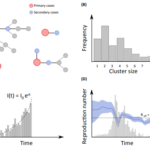Lien vers Pubmed [PMID] – 30738632
Lien DOI – S1471-4922(19)30022-410.1016/j.pt.2019.01.009
Trends Parasitol 2019 05; 35(5): 369-379
Mathematical models play an increasingly important role in our understanding of the transmission and control of infectious diseases. Here, we present concrete examples illustrating how mathematical models, paired with rigorous statistical methods, are used to parse data of different levels of detail and breadth and estimate key epidemiological parameters (e.g., transmission and its determinants, severity, impact of interventions, drivers of epidemic dynamics) even when these parameters are not directly measurable, when data are limited, and when the epidemic process is only partially observed. Finally, we assess the hurdles to be taken to increase availability and applicability of these approaches in an effort to ultimately enhance their public health impact.


